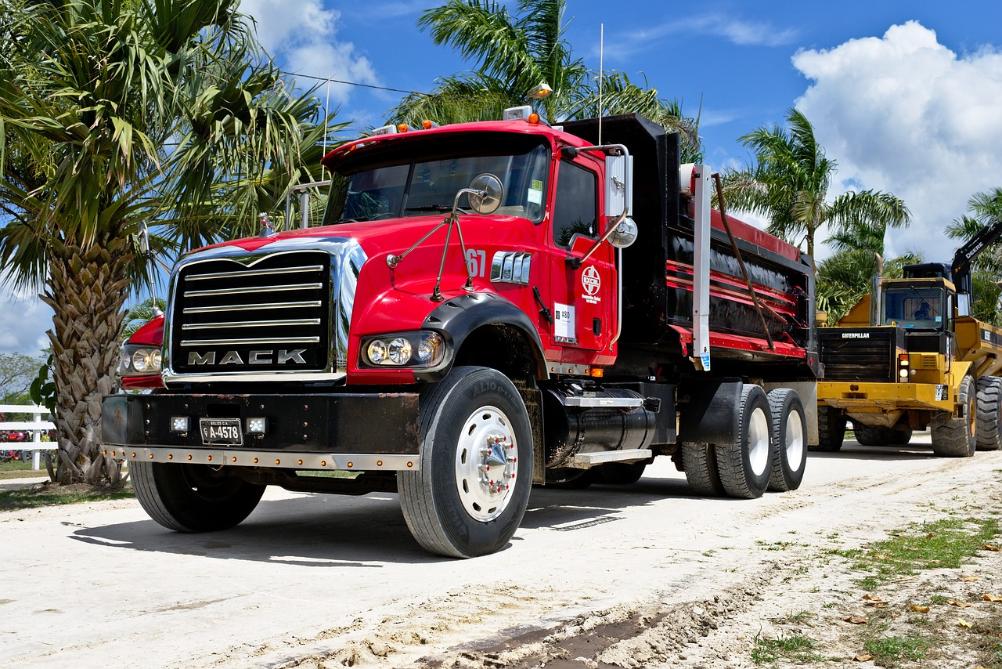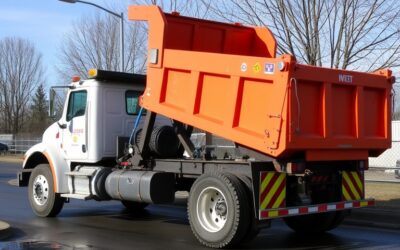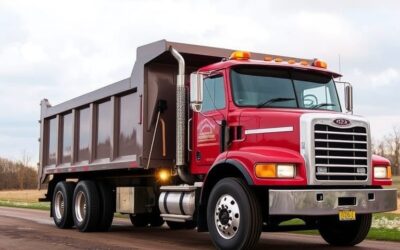Frame type dump trucks are crucial for transporting heavy loads in industries like construction and mining. While these vehicles handle rough terrains, they also come with tipping risks. Tip-overs can cause severe accidents, property damage, and even fatalities. Identifying and addressing these dangers is vital for ensuring a safe work environment.
Common Tipping Hazards for Frame Type Dump Trucks
Frame type dump trucks face multiple tipping risks that operators need to stay aware of. Uneven terrain is one of the biggest hazards. When a dump truck navigates rough or sloped ground, the uneven surface can easily destabilize the vehicle. This instability is especially dangerous during the dumping process, where the high center of gravity makes the truck prone to tipping.
Another critical hazard is improper loading. Unevenly distributed loads can cause the truck to become unbalanced. For example, if more material is loaded on one side, the truck’s weight distribution is off, increasing the risk of tipping. It is essential to load materials evenly and mind the truck’s weight limits to prevent such issues.
Additionally, rapid movements and sharp turns pose tipping risks. Frame type dump trucks should not make sudden accelerations, hard braking, or quick turns. These actions increase the chances of the vehicle losing balance and tipping over. Operators should always drive cautiously and avoid making sudden maneuvers that can lead to accidents.
Understanding these common tipping hazards is the first step in protecting your frame type dump truck from potential accidents.
Essential Safety Features and Technologies
Adding safety tech to your truck is a game-changer for keeping it upright and on the job. One crucial safety feature is the tilt sensor. These sensors monitor the truck’s tilt angle in real-time. If the angle exceeds safe limits, the sensor alerts the driver to take corrective action, such as stopping the dumping process or repositioning the truck.
Another vital technology is the automatic bed lowering system. This system activates when a tipping risk is detected, automatically lowering the truck bed to bring down the center of gravity. Lowering the bed stabilizes the vehicle, reducing the chance of a tip-over. This feature is especially beneficial during the unloading process.
Load monitoring systems also play a crucial role. These systems ensure that the load is evenly distributed and within the truck’s capacity. They provide alerts if the load is unbalanced or too heavy, allowing the operator to adjust the load before continuing the operation.
Lastly, real-time feedback mechanisms, such as visual and auditory alerts, keep the driver informed about the truck’s stability status. These alerts enable prompt responses to potential tipping hazards, ensuring that the driver can take immediate action to prevent accidents.
By integrating these essential safety features and technologies, frame type dump trucks can operate more safely and efficiently, minimizing the risks associated with tipping.
Best Practices for Preventing Tipping
Preventing tipping requires a mix of safe driving and constant vigilance. Here are some best practices to help safeguard your frame type dump truck:
- Proper Loading and Unloading: Always load materials evenly to maintain the truck’s balance. Avoid overloading by adhering to the truck’s specified weight limits. During unloading, ensure the truck is on level ground to prevent the bed from becoming unstable.
- Regular Maintenance: Conduct routine inspections and maintenance of your dump truck. Check for any mechanical issues that could affect stability, such as worn-out tires or faulty suspension systems. Regular maintenance ensures that your truck remains in optimal operating condition.
- Driver Training: Train operators on the specific handling characteristics of frame type dump trucks. Emphasize the importance of cautious driving, especially when navigating uneven terrain or making turns. Experienced drivers are less likely to make errors that could lead to tipping.
- Use of Safety Equipment: Equip your dump trucks with essential safety features, such as tilt sensors and load monitoring systems. These technologies provide real-time feedback, allowing drivers to take preventive actions quickly.
- Monitor Weather Conditions: Weather can significantly impact the stability of dump trucks, especially in muddy or icy conditions. Plan operations according to weather forecasts and avoid operating on unsafe ground.
By following these best practices, you can significantly reduce the risk of tipping and ensure safer operations for your frame type dump trucks.
Implementing and Maintaining Anti-Tip Kits
Anti-tip kits are essential for enhancing the safety of frame type dump trucks. To ensure these kits function optimally, proper implementation and maintenance are crucial.
First, focus on correct installation. Follow the manufacturer’s guidelines closely and consider professional help to install the system accurately. Proper installation guarantees that all sensors, control units, and automatic systems are correctly positioned and integrated with the truck’s existing machinery.
Second, routine maintenance is key. Regularly inspect the anti-tip kit components, such as sensors, control units, and wiring. Address any signs of wear and tear promptly to avoid system failures. Routine checks can identify potential issues before they become significant problems.
Third, update software and firmware. Technology evolves, and periodic updates may be necessary for the anti-tip system to function at its best. Stay in touch with the manufacturer for any available updates that can enhance system performance.
Fourth, train operators on the use of the anti-tip kit. Make sure they understand how the system works, including how to respond to alerts and take corrective actions. Proper training ensures that drivers can fully utilize the safety features provided by the anti-tip kit.
By focusing on these steps, you can maximize the effectiveness of your anti-tip kits and ensure that your frame type dump trucks operate safely.
Conclusion
Tipping poses a serious risk to frame type dump trucks, causing downtime and accidents. By understanding tipping hazards and using essential safety features, you can reduce these dangers. Follow best practices in loading, driving, and maintaining your vehicles, while also implementing advanced technologies like anti-tip kits.
Investing in anti-tip kits and following proper installation and maintenance protocols create a safer working environment. Anti-tip kits provide real-time monitoring and automatic corrective actions, enhancing the stability of your trucks. Alongside vigilant operational practices, these technologies can prevent tipping incidents and protect both your operators and your assets.
To enhance the safety of your frame type dump trucks, explore the advanced anti-tip solutions offered by Wink Anti-Tip. Our innovative products are designed to safeguard your operations and ensure peace of mind. Contact us today to learn more about how Wink Anti-Tip can help you protect your trucks from tipping hazards.





